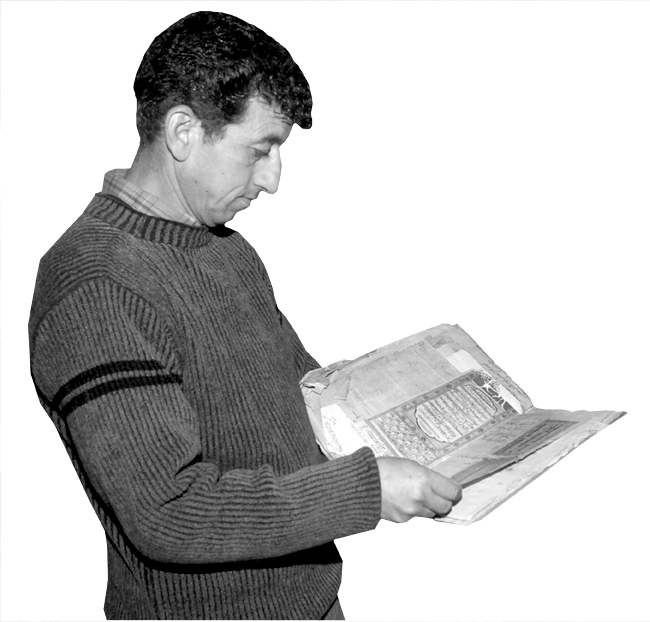Nothing hinders Manzoor Daikoo from collecting rare Kashmiri manuscripts, not even his financial constraints. Hamidullah Dar interacts with the manuscript man
(Manzoor Daiko)
He is obsessed with historical Kashmiri manuscripts. Obsessed is but a small word. Manzoor Ahmad Daikoo, 46, has so far sold eight kanals of land to procure rare manuscripts.
His countrymen are indifferent, but Daikoo is the darling of scholars from outside. He is often invited by reputed universities including Oxford, to present papers on cultural history.
“I spend all my earnings on the purchase and maintenance of the manuscripts, books, photographs and other historical documents. I know Kashmiris are indifferent to their heritage. So I am trying to preserve whatever comes my way,” Daikoo says.
Born in a middle class family at Brein Nishat, Daikoo discovered his penchant for Kashmir’s cultural past at an early age. “A religious scholar gave me a manuscript of religious importance at my maternal uncle’s house in my childhood. He told me to preserve it. I did and slowly developed an interest in collecting antiques,” says Daikoo, leering at the vast treasure haphazardly scattered in his repository.
There are 42,000 books nearly 7,000 manuscripts besides rare photographs. The books are haphazardly dumped in a room. The scene depicts a blended spectacle of government apathy and people insensitiveness towards the cultural history of Kashmir. This insensitive attitude pains Daikoo.
“Europeans are piecing their history together. We have one of the richest cultural histories in the world but we destroy it with our own hands. European scholars visit my library and benefit from it. They complete their research projects pertaining to Kashmir here. But no Kashmiri scholar has come here for research,” he says with a dismayed gaze. Daikoo founded Kashmir Research Institute in 1984. Money was the biggest constraint. Daikoo earned little from a small government job. Passionate, he chose manuscripts over real estate. “Till now, I have sold eight kanals of land from my ancestral property in posh areas for purchasing manuscripts and rare books,” Daikoo informs.
Tareekh-e-Firishta, a leather-bound voluminous work weighing 15 Kgs was the cheapest. It cost Rs 32,000. History of Kashmir by a descendant of Shah-e-Hamdan who lived at Rajpura was the costliest. Daikoo says he purchased it for Rs 3,00,000.
Daikoo’s collection includes Kashmir Lok Katha, a collection of several volumes written over a period of two centuries beginning 1000 AD. It is written in Sharda Script on birch leaves (Burza). There are hand-written manuscripts of Kashmir history, some of them 500 years old.
But that is just a brief mention of Daikoo’s treasure. The rich repository has helped 23 scholars from countries like Germany, UK and USA to complete their research.
“Every bit of Kashmir history is replete with richness and strength,” says Daikoo. “When I see our cultural treasures lying in the houses of Europeans, my resolve to procure, purchase and preserve the cultural heritage of Kashmir becomes stronger. I only appeal my countrymen and state government to show some compassion towards our past which can boost our identity and individuality.”
Author of seven books and 300 research papers in different languages, Daikoo was chosen by the United Nations Educational, Scientific and Cultural Organization (UNESCO) as the Man of Asian History vide Vol. 23 at a ceremony in Tokyo in 2005. He also received Lenin Award at Tashkent University for his research titled Natural Relations between Kashmir and Central Asia. But he has grudges from countrymen.
“National Manuscript Mission and Department of Archives do come to me but so far they have not provided any help for preservation of the rare books and manuscripts. Kashmir has many cultural trusts. What work do they do except organising dances and distributing certificates?” Daikoo asks. He sees the government indifference as deliberate, meant to present Kashmiris as “ignorant and uncivilised people.”
“New Delhi is afraid of the richness of our creative history and shows lack of seriousness in its preservation. Indians want to present Kashmiris as a people with no civilised and culturally luminous past. It is up to Kashmiris to preserve it,” affirms Daikoo. “I have seen Kashmiri cultural showrooms in Europe that collect rare artefacts in Kashmir and Ladakh and then sell them to Europeans. It is tantamount to murder of our cultural history. Some Germans told me that they hoisted white flags on the buildings housing cultural heritage during World War I and II to save it from bombardment by allied forces,” Daikoo says while drawing comparison.
With little resources Daikoo finds it hard to preserve the manuscripts and rare books. His humble salary is insufficient for the task. The books are gathering dust and breeding mites. Manuscripts and photographs are losing to the test of time in absence of latest preservation techniques. When one leaves Daikoo’s library, the insensitivity of a nation towards its cultural treasure creeps in.

















Mr. Daikoo article 2010
Dear Mr daikoo,
I am thrilled to read about you in the telegraph, Kolkata. I am a paper conservationist and would love to help your efforts. Even cataloging can be organised with little expense if you take the help of lib science students. I would love to hear from you and keep in touch. Manoj Haralalka, Kolkata.
dear Daikoo sahib. Adab, What a great vocation you have undertaken. I salute your efforts and am eager to meet you.